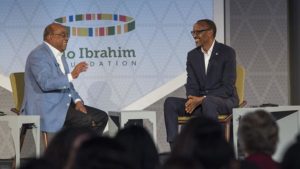 IN Rwandan culture, nothing is more precious than a visitor; the ‘milk for visitors’ is set apart and handled with special care.
IN Rwandan culture, nothing is more precious than a visitor; the ‘milk for visitors’ is set apart and handled with special care.
An evening chat with visiting colleagues last week however, revealed that the culture is shared across the continent; a Senegalese insisting that ‘Teranga’ (hospitality) is even a national slogan.
So too will I not diverge from the culture and begin my piece with a word of thanks to visiting colleagues and brethren, congratulate this edition’s Laureate, Madam Ellen Johnson Sirleaf, former Liberian President, and thank Mr. Mo Ibrahim for the great concert at the closing of the Mo Ibrahim Governance Weekend.
That said; allow me to nuance my feelings on the Mo Ibrahim Prize.
There are two types of Pan-Africanists: The old guard, a ‘noble army of the martyr’ praising Lumumba, Nkrumah and Sankara, while setting their countries on a dignified road to starvation, and the movers and shakers.
Mo Ibrahim is part of the latter; a new generation of Africa’s golden boys who put their money where their mouth is – so to speak. While a confluence of both would be ideal, the two schools seem, sadly, not to be speaking to each other.
As a result, the Prize serves more as reward than an incentive to good governance in Africa, for the simple reason that African leaders do not expect bribery to do the right thing, and I fear, the five million Prize money solves a problem that did not exist; that of African leaders starving after leaving office.
As a one-time collector of Rwanda’s data for the Mo-Ibrahim index, I was deflated in realizing that perhaps we may not be the audience nor the essence.
The index keeps improving every year, but multiparty democracy, opposition and elections; its consistent hallmarks, are evidently less consequential to good governance in Africa than we are made to believe, and practicing them routinely does not necessarily improve people’s lives, at times, making life worse.
What of people like Rwandans who believe in dialogue and consensus as foundations of their politics? Does the index provide room to validate country contexts?
What of governance problems on the continent that originate from – or benefit forces outside of Africa? Does the index intend to push the envelope beyond the continent, and hold to account all protagonists to Africa’s governance?
The Democratic Republic of Congo for instance, does not manufacture AK 47 rifles or telephone headsets; in other words, the head and tail of its problems are exogenous.
Scores of African populations have dictators at their helm, precisely because they were not left to choose their leaders, or the timing, criteria and process for choosing the said leaders was defined, imposed, funded and ‘observed’ by the powers that might be, using predetermined governance templates.
During a conversation with Rwanda’s President Paul Kagame, Mo Ibrahim asked if he wished Rwanda to become ‘the Switzerland of Africa’. No, he said, ‘I want Rwanda to be the Rwanda of Africa’.
That exchange is really at the heart of my discomfort with the Mo-Ibrahim Index; I think Mr. Ibrahim would like to turn African states into Switzerlands. Don’t get me wrong, Switzerland is a wonderful country and he means well.
However it is virtually impossible for Rwanda to become Switzerland, because the people, history, geographic location, economy, and everything else combined have nothing to do with one another.
Persistence in trying to turn it into Switzerland might unwittingly derail Rwanda from its organic, unique path to fulfilling its own happiness.
All that said, it would be unfair not to give credit where it is due. Mr. Mo Ibrahim has given us a foundation and a platform.
Thanks to this year’s edition, we had opportunities on the sidelines of the event to meet and engage among Africans on our governance issues, and have edifying conversations with former Ethiopian President Haile Mariam Dessalegn and Rwanda’s President Paul Kagame.
Mister Ibrahim also gave a powerful interview to France 24, debunking western media’s prejudice towards Rwanda and Africa.
Perhaps missing on the agenda were issues of the ‘form-over-substance’ nature of the Prize Money, the risk of liberal democracy in fragile states or what Zambian Author Dambisa Moyo described as ‘the predilection for short-termism that has become embedded in the political and business culture of modern democracies’, readily calling for a total ‘democracy overhaul’
But the conversation continues…
In ending, let me reiterate that this year’s prize laureate Madame Ellen Johnson Sirleaf is deserving. It wasn’t a given that Liberia would remain a stable and unified nation.
The first woman to be elected president on the African continent, she inherited a country profoundly shattered by civil war and managed to pacify, stabilize and put it on the path to prosperity.
Perhaps the most trying times of her presidency were in 2014 when her country was hit by an Ebola virus outbreak. She faced the most difficult challenges of a head of state and confronted them.
Her famous successor Mr. George Weah, as well as women of our continent will be standing on the shoulders of a giant.
All in all, thank you Mo.















Leave a Reply